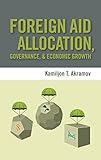Foreign Aid Allocation, Governance, and Economic Growth / Kamiljon T. Akramov.
Material type: TextPublisher: Philadelphia : University of Pennsylvania Press, [2012]Copyright date: ©2012Description: 1 online resource (184 p.) : 8 illusContent type:
TextPublisher: Philadelphia : University of Pennsylvania Press, [2012]Copyright date: ©2012Description: 1 online resource (184 p.) : 8 illusContent type: - 9780812244656
- 9780812207736
- Developing countries -- Economic conditions
- Economic assistance -- Developing countries -- Evaluation
- Economic development -- Social aspects -- Developing countries
- Economic indicators -- Developing countries
- Political Science
- BUSINESS & ECONOMICS / Development / Economic Development
- Business
- Economics
- Political Science
- Public Policy
- 338.91091724
- online - DeGruyter
- Issued also in print.
| Item type | Current library | Call number | URL | Status | Notes | Barcode | |
|---|---|---|---|---|---|---|---|
 eBook
eBook
|
Biblioteca "Angelicum" Pont. Univ. S.Tommaso d'Aquino Nuvola online | online - DeGruyter (Browse shelf(Opens below)) | Online access | Not for loan (Accesso limitato) | Accesso per gli utenti autorizzati / Access for authorized users | (dgr)9780812207736 |
Frontmatter -- Contents -- Figures -- Tables -- Foreword -- Acknowledgments -- Acronyms and Abbreviations -- 1 Introduction -- 2 Overview of Previous Studies -- 3 Data and Descriptive Analysis -- 4 Aid Allocation -- 5 Aid and Economic Growth -- 6 Conclusion -- A Development Thinking and Foreign Aid -- B Lists of Donors and Aid Recipients -- C Definitions and Sources of Regression Variables -- D Descriptive Summary Statistics -- E General Characteristics of Political Rights Scores and Civil Liberties Scores -- F Governance and Rent Extraction-Efficiency Trade-off in Aid Allocation -- G Derivation of the Growth Equation Augmented with Human Capital -- References -- Index -- About the Author
restricted access online access with authorization star
http://purl.org/coar/access_right/c_16ec
How important is foreign aid in fostering economic growth in developing countries? Does it help recipient countries, hurt them, or have little effect either way? Foreign Aid Allocation, Governance, and Economic Growth investigates this issue by looking at foreign aid by sector rather than treating it as an aggregate amount. Aid can be allocated to a recipient's production sectors (such as agriculture, manufacturing, or mining), economic infrastructure (such as transport, storage, or communications networks or power generation facilities), or social sectors (such as education or healthcare). This book differentiates among various channels through which each of these three categories of foreign aid affects economic growth.The findings suggest that economic aid, including aid to production sectors and economic infrastructure, contributes to economic growth by increasing domestic investment. Aid to social sectors, however, does not appear to have a significant impact on human capital (measured by school enrollment) and economic growth. This study also assesses the degree to which the quality of democratic governance in a recipient country influences foreign aid's effectiveness and finds that democracy is no guarantee of aid effectiveness. In fact, economic aid to less democratic countries can lead to better economic growth, at least initially, provided the aid recipients secure property rights and allow capital accumulation. Although further research into the question is necessary, Foreign Aid Allocation, Governance, and Economic Growth suggests that aid targeted to increasing domestic investment might be an effective means of fostering economic growth in less developed countries.
Issued also in print.
Mode of access: Internet via World Wide Web.
In English.
Description based on online resource; title from PDF title page (publisher's Web site, viewed 24. Apr 2022)


